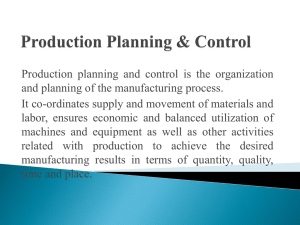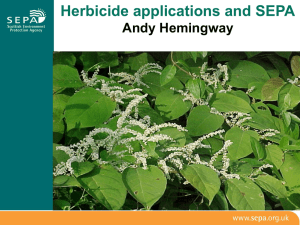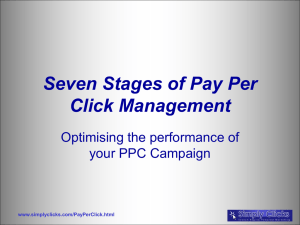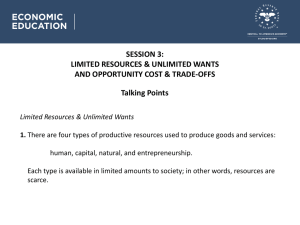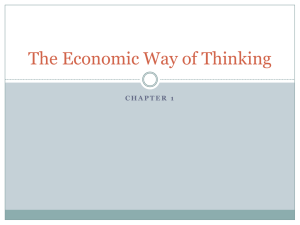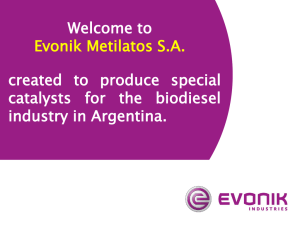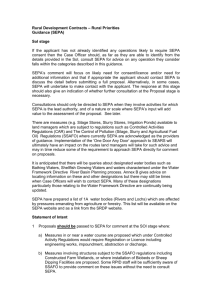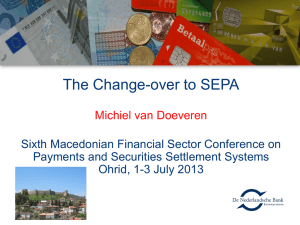Biofuels and (Waste) Legislation
advertisement
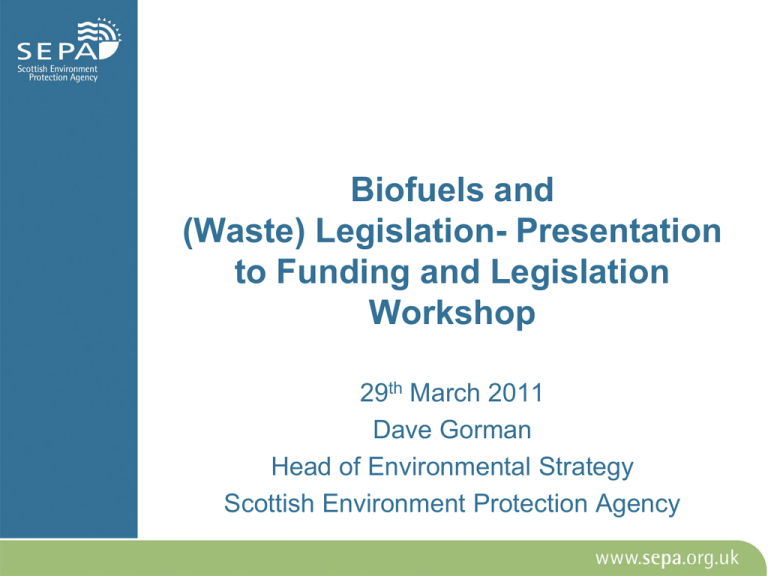
Biofuels and (Waste) Legislation- Presentation to Funding and Legislation Workshop 29th March 2011 Dave Gorman Head of Environmental Strategy Scottish Environment Protection Agency Brief overview of environmental legislation that may apply Pollution Prevention & Control (PPC) Waste Management Licensing and exemptions (WML and WMX) Control of Major Accident Hazards (COMAH) Controlled Activities Regulations (CAR) Waste Incineration Directive (WID) Waste Framework Directive Animal By-products Regulations (ABPR) (administered by Scottish Government – Animal Health) Requirements • If under PPC or WML then you need an environmental license before you can start operating • If WMX then you need to register an exemption with SEPA • If under CAR then depending on the scale of the activity you will need a licence, registration or follow a general binding rule • If COMAH you need to notify HSE & SEPA and then depending on scale prepare & submit a safety report for assessment before you can start • If WID then you need a PPC permit (as above) • If ABPR you will need permission from Animal Health as well as a licence from SEPA Biodiesel: a case study • Making biodiesel from waste vegetable oils. • Uses physical and chemical processing (trans-esterfication) • Prescribed as an activity for control under PPC Part A as a chemical process. • There is no lower throughput threshold level Biodiesel:a case study (2) • May not be a Chemical PPC activity if not commercial or at industrial scale. • SEPA undertook a review and with Scottish Government concluded that if capacity is less than 200 tonnes biodiesel production per year then would not be considered to be subject to PPC Part A • A new waste management exemption was issued to allow <200 tonnes per year biodiesel production without need of a licence (still require to comply with certain conditions and other legislation) Developments – gasification Kerosene for aircraft fuel using mixed wastes such as municipal waste. Gasification to produce carbon and hydrogen rich syngas followed by Fischer-Tropsch reaction to produce hydrocarbons Gasification - PPC Part A Producing Hydrocarbons – PPC Part A Developments – biological route • Anaerobic Digestion producing syngas currently burned in gas engine/CHP • Syngas could be used either in Fischer – Tropsch reaction or • used as feedstock for bio fermentation (ethanol/butanol) or • Used in a fuel cell • “Traditional” AD plants would likely be regulated under WML or WMX unless taking animal by-products >10 tes/day which would require PPC • Syngas conversion would probably be PPC Part A Developments – fuel cells • As with previous routes generate syngas to be used directly in a fuel cell • Syngas generation will probably require a licence of some kind Developments - biomass • Several large biomass plants already in operation • Eon Stevenscroft, Lockerbie • UPM Kynmee, Irvine • PPC Part A combustion with WID controls (due to potential for contaminated biomass) • 4 proposed by Forth Ports (currently at Section 36 Electricity Act (planning) stage) • Not all biomass burning requires licence depends on scale and source/type of waste biomass Waste Framework Directive • Recently Revised • Requirement to hold a licence or exemption to undertake waste disposal or recovery operations (In UK through either PPC, WML or WMX) • Key question in this sector will be “Is biofuel made from waste still a waste?” Bio fuel – Is it still a waste? • Treating or processing a waste material does not mean that the ”product” will automatically be considered to be fully recovered and not a waste • Several tests have to be applied • Guidance on ‘Is it waste?’ on SEPA’s website • If product still considered to be a waste then burning as a fuel will require PPC Part A permit with WID controls Example • Biodiesel made from vegetable oils and tallow by Argent Energy – not a waste (other outputs might be still a waste e.g. residues). Biodiesel produced can be blended with fossil diesel at the refinery with no further environmental licence controls required Working with Industry • SEPA happy to engage with industry sector level and others • Establish positions, protocols, interpretation at high level • Consistency of approach • Advise Scottish Government of legislative changes that may be required (e.g. WMX for biodiesel) Example • FREDS Sub Group on hydrogen economy Energy Position Statement • Sets out our strategic view on energy and renewables: • http://www.sepa.org.uk/about_us/news/2011/s epa_sets_out_how_it_will_help.aspx • Launched February 2011 • Supportive of renewable energy including bioenergy but with caveats… Advice • Complex area • Speak to local SEPA office… • NETREGS: netregs.gov.uk… • SEPA website – position statements; contacts for offices etc….

